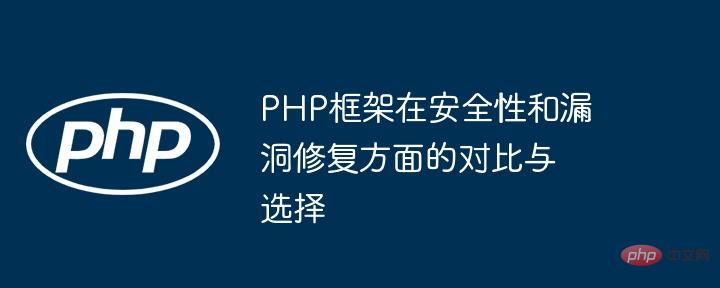Home >Backend Development >PHP Tutorial >Comparison and selection of PHP frameworks in terms of security and vulnerability repair
Comparison and selection of PHP frameworks in terms of security and vulnerability repair
- PHPzOriginal
- 2024-06-04 16:40:001290browse
Laravel, CodeIgniter, and Symfony all offer security features, including CSRF and XSS protection, but the specific benefits vary. Laravel is known for its comprehensive security features, rapid vulnerability fixes, and detailed documentation; CodeIgniter focuses on user input filtering and secure forms; Symfony provides a wide range of security components, configuration flexibility, and automatically updated dependencies.

Comparison and selection of PHP frameworks in terms of security and vulnerability repair
Introduction
In today's increasingly severe network security environment, it is crucial to choose a PHP framework with powerful security functions and vulnerability repair mechanisms. This article will compare three popular frameworks, Laravel, CodeIgniter and Symfony, analyze their advantages and disadvantages in terms of security and vulnerability repair, and provide practical case illustrations.
Laravel
Laravel is known for its comprehensive security features, including:
- CSRF Protection: Prevent Cross-site request forgery attack.
- SQL injection protection: Prevent SQL injection through prepared statements and parameterized queries.
- XSS Prevention: Automatically escape user input by using HTML entity encoding.
- Secure HTTP Headers: Set secure HTTP headers to prevent vulnerabilities such as clickjacking and Cross-Origin Resource Sharing (CORS).
Vulnerability Fixes
The Laravel team takes security vulnerabilities very seriously and actively monitors security advisories. Major security updates are typically released within hours, while minor updates are released within weeks.
Actual case
Fixing SQL injection vulnerability
// 容易受到SQL注入的代码
$query = "SELECT * FROM users WHERE username = '".$_GET['username']."'";
// 使用预处理语句和参数化查询修复的代码
$stmt = $db->prepare("SELECT * FROM users WHERE username = ?");
$stmt->execute([$_GET['username']]);CodeIgniter
CodeIgniter also provides a series of security features, including:
- XSS filtering: Use the XSS filtering library to filter user input.
- CSRF protection: Provides CSRF protection function.
- Secure Forms: Automatically create secure forms with CSRF tokens.
- Input validation: Built-in input validation rules, including whitelist and blacklist.
Bug fixes
The CodeIgniter team is also working on bug fixes, but its response speed may be a little slower than Laravel. Major security updates are typically released within days, while minor updates are released over weeks or months.
Actual case
Fix XSS vulnerability
// 容易受到XSS的代码 echo $input; // 使用XSS过滤修复的代码 echo htmlspecialchars($input);
Symfony
Symfony is a more complex but powerful framework that provides a wide range of security features, including:
- Security Components:Provides security components such as CSRF protection, firewalls, and identity verify.
- Configuration driver: Allows you to customize security configuration to meet specific needs.
- Regular Vulnerability Scans: The Symfony security team conducts regular vulnerability scans and quickly releases patches.
- Dependency Manager: Use Composer as a dependency manager, which can automatically update dependencies for bug fixes.
Bug Fixes
Symfony is known for its rapid vulnerability fixing mechanism, often releasing patches within hours of security issues being reported.
Actual case
Fixing CSRF vulnerability
// 配置CSRF保护
$csrfToken = $request->getSession()->get('csrfToken');
// 使用CSRF令牌保护表单
echo '<input type="hidden" name="csrfToken" value="'.$csrfToken.'">';The above is the detailed content of Comparison and selection of PHP frameworks in terms of security and vulnerability repair. For more information, please follow other related articles on the PHP Chinese website!
Related articles
See more- The latest 10 thinkphp video tutorial recommendations in 2023
- There is important information in the USB flash drive. How to make it safer for colleagues to temporarily borrow it?
- The latest PHP interview questions in 2022 (with answers)
- What is a security key
- How to completely close the Security Center in Windows 10

